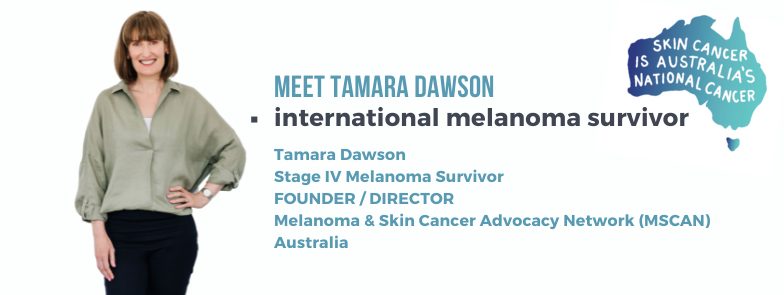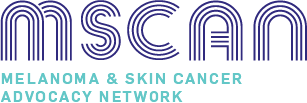Featured Survivor Story:

By Mara Klecker
Two-thirds of Australians will be diagnosed with a type of skin cancer by the time they are 70. Despite the prevalence, Australians still don’t take skin cancer seriously enough, says Tamara Dawson, a Stage IV melanoma survivor.
Tamara hopes to change that. After years of policy work in Australia, Tamara launched the Melanoma and Skin Cancer Advocacy Network (MSCAN) in 2020.
Tamara’s own experience of being diagnosed with advanced melanoma in 2015 led her to establish MSCAN. Having seen her general practitioner with abdominal pain, she was shocked to learn she had cancer that had spread to her liver. The next nine months were rough as she underwent surgery, radiation therapy, and immunotherapy, which she continued every few weeks for a couple of years.

Tamara Dawson, Stage IV melanoma survivor Founder & Director Melanoma & Skin Cancer Advocacy Network (MSCAN)
Her own experience navigating the healthcare system helped her recognize the gaps in services for melanoma patients, from the moments after that first diagnosis through to the unique needs and challenges of melanoma survivors.
“I remember looking around a busy hospital clinic and thinking, ‘Wow, all these families are going through something like this,’” she said.
Tamara was working in trade policy and wondered if she could use her own understanding of policy and advocacy to make a difference for Australians facing diagnoses like hers.
“There was just this enormous learning curve that I felt when I was diagnosed,” she said. That was true for her family too – particularly because t immunotherapy was very new, and they weren’t sure what side effects it could bring.
The incredible new treatment options for advanced melanoma – immunotherapy and targeted therapy – also bring about a different set of needs in the melanoma community, Tamara said.
“There was this whole new group of people like me who started treatment after a tough diagnosis and then survived and went on to live pretty normal lives. We work, we spend time with our family and friends, we contribute to our communities,” she said. “But that presents a whole new need for resources for survivorship.”
So Tamara set out to fill that need. She wanted to find better ways to provide for a patient’s wellness, not just treat their illness.
“In Australia, I felt there was a big gap without an independent, consumer-led, national nonprofit for both melanoma and non-melanoma skin cancers, especially considering the rates of skin cancer we have here,” she said.
After many inspiring discussions with clinicians, researchers and patients, Tamara decided to form MSCAN. Since its start in 2020, it’s continued to grow, and Tamara resigned from her policy job to focus on the organization full time.
“It’s gone so incredibly well and exceeded my expectations already,” she said.
Each of MSCAN’s board members has also been affected by a melanoma diagnosis, which was important to Tamara as she created the nonprofit she wished existed when she started her melanoma journey.
“When I was first diagnosed, I wanted to know there was an organization that had my back,” Tamara said. “I wanted people who just ‘got it’ and had been through it, and were advocating for patients’ needs.”
MSCAN’s three pillars are advocacy and influencing healthcare policy, innovation in care and research, and information and resources. So far, MSCAN’s podcasts–which include conversations with patients and physicians–have proved popular, and the organization has a partnership with the Melanoma and Skin Cancer Nurses Organization.
“We want to be a network, we want to collaborate,” Tamara said. “We’re so much stronger together when we partner in Australia and internationally.”
MSCAN is a part of The Melanoma International Patient Advocacy Coalition (MIPAC), a group founded by AIM to collaborate with organizations across the globe in their efforts to increase awareness and change public perceptions of melanoma, empower melanoma patients to take an active role in their care, and effect change in regulatory policies to optimize treatment and care.
“We really value our partnership with AIM,” Tamara said. “MIPAC is an incredible group and an opportunity to share ideas about what works. I know it’ll help make sure our voice of advocacy in Australia is stronger and more well-informed.

About MSCAN: The Melanoma & Skin Cancer Advocacy Network (MSCAN) provides a new, innovative approach to tackle Australia’s national cancer.
Recent Posts

From a Scare to Awareness: Lindsay Willis’s Mission to Educate on Melanoma Risks

Everything Coming up Rosy is not a Health Tune

Ways to Give: How You Can Donate Your Birthday Through Facebook

Beyond the Clinic Podcast: Navigating the Storm: Managing Stress and Anxiety Through Your Cancer Journey

